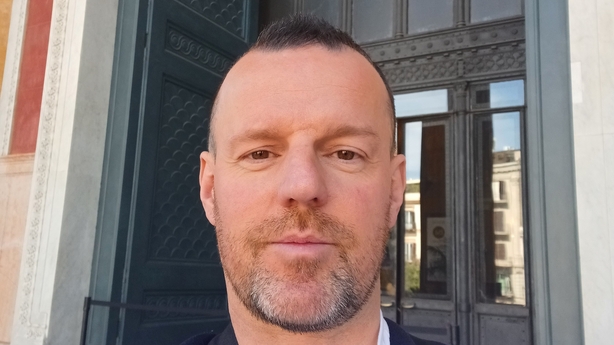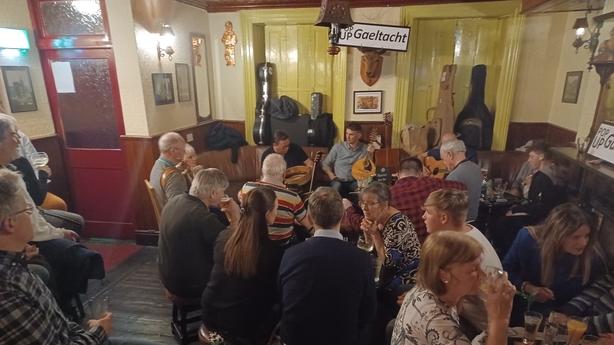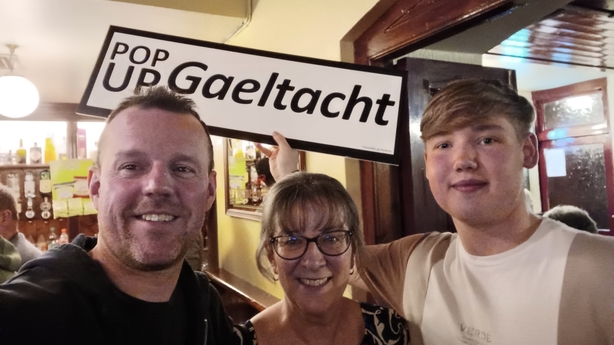Nuair a fuair Derek Hollingsworth amach go raibh an Ghaeilge i mbaol, chinn sé ar gníomhú - ní hamháin go bhfoghlaimeodh sé í ach go scaipfeadh sé an soiscéal ar bealaí éagsúla, ach go háirithe tréna bhlag, Irish Language Matters.
Is é fotheideal an blag ná 'A blog about language issues', ar a bhfuil go leor altanna spéisiúila ar nós '100 days of Gaeilge Challenge: the first 25 days'; '10 Quotes on Language from Ngũgĩ wa Thiong'o'; agus 'Language: Can Ireland Learn from Wales?'. Labhair RTÉ.ie/Gaeilge le Derek le fáil amach mar a thóg sé an bóthar seo.
Mínigh dúinn cén chúis gur chinn tú ar an nGaeilge a fhoghlaim ar dtús?
"I suppose I was becoming aware that the language was under threat, something I hadn't appreciated at all. That would have been the real inspiration. Having been in a Gaeltacht area for a few days and not hearing any Irish spoken left a big impression on me because I naively thought that all Gaeltacht areas were one hundred per cent Irish-speaking and that you’d nearly have to tap people on the shoulder and say 'Can you speak english please?’"
"I was mistaken, obviously, and that was a bit of a shock. So I felt that I should just get involved and do something other than complaining. I’ve always been a bit of an activist and if there’s something I have a passion for, I want to get involved, and want to be part of solution rather than just sitting on the fence and giving out about things. So that was really it."
"That was around 2011, 2012 when I started to take my first steps to learn the language from a very low base. I have to say the first assessment I took I got 8 percent in. So I really don't remember a lot of Irish from school."

Cár chuaigh tú ag foghlaim mar sin?
"I started off with classes with Conradh na Gaeilge. I did a beginners class there, then myself and some parents in the Dublin 15 area contacted the Dublin Dún Laoghaire Education Training Board who provided us with a teacher. We rented spaces in community centres and put on Irish classes. The majority of people attending those classes would have been people whose kids were learning Irish in the local naíonraí and Gaelscoileanna."
"But there would have been other people, older people, retired people or people from different countries, different backgrounds who wanted to learn Irish and yes, we progressed with that. And over the years I was fortunate to get out to do a couple of courses with Gaelchultúr as well."

"That was in Dublin, but I actually spent time on holidays in Inis Oírr, in Gaoth Dobhair, in Connemara. So I do try and get to the Gaeltacht areas as well and I insist on speaking Irish if I’m with an Irish speaker. I'll just keep speaking Irish and sometimes they’ll start speaking back to you in English, but if you persist with Irish they will speak Irish to you as well."
"And so between courses, setting up social events in the Pobal Gaeilge 15 area and the Gaeltacht and Irish language events in Dublin that’s what I’ve done."
It's about exposing yourself as much as you can - listening to Raidió na Gaeltachta, watching TG4, going to the cinema when there’s a an Irish film out."
Tú féin a thumadh isteach ann, cineál tumoideachas?
"Tumoideachas, sin é!"
So you have actually achieved quite a bit, you know, outside of your own goal of bheith ag foghlaim Gaeilge with Pobal na Gaeilge in Ongar and BÁC 15 chomh fada amach le Dún Bóinne. Agus bhfuil tú ag scríobh leabhar ina thaobh seo nó arbh as sin a tháinig an blag, Irish Language Matters?
"Tháinig an smaoineamh don leabhar ar dtús agus arís, nuair a thuig mé go raibh an teanga i mbaol, thosnaíos ag léamh fén stair agus fé stair na dteanga agus bhí mé ag cuimhneamh, ‘Crikey, níor thuigeas faoi seo in aon chor, this was all news to me!’, an bealach gur tháinig athrú ar riocht agus seasamh an teanga agus mar sin de. Rith sé liom go mbeadh sé spéisiúil scríobh ina thaobh seo mar staidéar síceolaíoch, mar gurb shin an cháilíocht agam féin ón dtriú leibhéil."

"Bhí mé ag caint leis an Ollamh Conchúr Ó Giollagáin, a dhein staidéar theangeolaíoch Gaeltachta sa bhliain 2007, tá sé anois i Samhail Mór Óstaigh ar Oileán Sgítheanach in Albain. Eisean a dúirt liom nach raibh aon duine tar éis scríobh faoi seo ón radharc síceolaíochta de fós. Mar sin sin atá ar bun agam agus is as sin a tháinig an blag. Tá roinnt rudaí nach bhfuil cuí don leabhar ach a bheadh go maith ar an mblag."
"Agus is chun aird a tharraingt ar an dteanga an cúis go bhfuilim gafa leis. Dóibh siúd cosúil liomsa. Tá na mílte duine ar fud na tíre a bheadh báúil don teanga ach go bhfuil cumas íseal acu sa teanga nó nach mbeadh muinín a dóthain acu í a úsáid ach gur mhaith leo tuilleadh di a chloisteáil agus a fheiceáil."
Ba mhaith leat iad siúd a thabhairt isteach faoi dhíon agus tacaíocht a thabhairt dóibh roinnt Gaeilge a fhoghlaim?
"Sin é."
So what would you say to people like you, back in 2011, who wonder why they don’t speak Irish, would like to but don’t know how to go about it?
"Well there’s not one reason why they don't speak Irish, there’s a multitude of reasons and a whole process that unfolded over centuries but we don’t have time to get into that...!"
"I would say ‘is fiú é’, it’s really worth it. It’s worth the journey."
"My initial motivation for getting involved and wanting to speak Irish and setting up Pobal Gaeilge 15 with Paula Melvin from Conradh na Gaeilge was because the language was under threat. But once I got to a certain standard in Irish and was able to go to socialise in Irish, go to the Pop-Up Gaeltacht, spend time with my kids in the Gaeltacht, go to the cinema and see Frank agus Róise, An Cailín Ciúin, Arracht, listen to Kneecap or whatever, it then just became self-sustaining because it was engagement with culture, fun and had a social element to it."
"So the idealistic part of it is only in the background now and the actual social engagement and the sense of identity, the world-view being different to the English language world-view – all of those things for me, are now what the important things are. They’re the things that continue to drive me to speak Irish and want to raise the level of visibility of Irish in the community."
In a twist of the Hugh Grant movie, Derek Hollingsworth is like the man who went up the mountain and came down a Gaeilgeoir.
Read the whole story, an scéal ar fad anseo.

